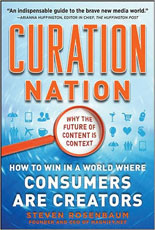Curation Comes in Many Shapes and Sizes
"There are some words that arrive in our world meaning one thing and over time morph into a new idea.
"Tweeting was a thing birds did, before Twitter. Now the word has new meaning. It used to be that you could learn about people you were interested in by researching them in print or by asking their friends. Now you Google them. The remarkable pace of change is having an impact on more than our lives and our interactions, it's changing the very words we use to describe what we do.
"Today, the word that describes much of what's changing is curation. It's both a new word and an old one.
"In the past we lived in a world of disciplines. The senior editorial leadership at magazines were known as editors. The folks who chose which TV shows played on a TV network were programmers. The people who picked which things would be on the shelves of your local stores were retailers. Each of these professions involved choosing the right items, putting them in the proper order, and creating a collection that was appealing to an audience or consumer. Oh, and there was that rarified individual who selected objects of art to present in a museum or gallery: they were called curators.
"Today, curation is the coin of the realm. Film Festivals curate their program. Web sites curate their editorial. The team at the shopping site Gilt Group curates the items it offers for sale. Curation was once a word that seemed to mean highbrow, expensive, out of reach of mere mortals. But today museum curators must compete with media curation at Newser, collections of handmade crafts at Etsy, or the curated collection of the best roll-on luggage at Squidoo. Certainly curation means quality, but now quality is in the eye of the beholder.
"Curation comes in many shapes and sizes. It is critically important to understand two things. First, curation is about adding value from humans who add their qualitative judgment to whatever is being gathered and organized. And second, there is both amateur and professional curation, and the emergence of amateur or pro-sumer curators isn't in any way a threat to professionals.
"Curation is very much the core shift in commerce, editorial, and communities that require highly qualified humans. Humans aren't extra, or special, or enhancements; humans are curators. They do what no computer can possibly achieve. There's far too much nuance in human tribes and the taste of groups and individuals. Curation is about selection, organization, presentation, and evolution. While computers can aggregate content, information, or any shape or size of data, aggregation without curation is just a big pile of stuff that seems related but lacks a qualitative organization.
"There are places where we're going to see curation happen first, mostly editorial enterprises such as Web sites, magazines, and other media. And although it may seem like curation, as a trend, is declaring war on old institutions we've known and trusted, the simple fact is that curation is going to save these organizations, not destroy them. Not long down the road, curation is going to change the way we buy and sell things, the way we recommend and review things, and the way we're able to mobilize groups of like-minded individuals to share, gather, and purchase as groups. Curated experiences are by their very nature better than one-off decisions about what to buy or whom to trust.
"But the real power of the trend toward a Curation Nation is that, for the first time, we can see a future in which individuals can galvanize and publish their passions and knowledge in a way that will create value from personal passions and niche expertise. Imagine a time when your love of travel, fine wines, and collectable lunch boxes each provides a revenue stream. Okay, maybe not a full-blown stream, but a revenue trickle; when these micro careers are knit together, your curated knowledge can evolve from a hobby to an avocation to one of the many gigs that pay the rent, keep your kitty in cat food, or help you save for a college tuition. Which is to say, curation is about something different than disintermediation. In fact, it's about re-mediation. It's about adding quality back into the equation and putting a human filter between you and the overwhelming world of content abundance that is swirling around us every day. Curation replaces noise with clarity. And it's the clarity of your choosing; it's the things that people you trust help you find.
"Curation is an exhilarating, fast-moving, evolving idea that addresses two parallel trends: the explosive growth in data, and our need to be able to find information in coherent, reasonably contextual groupings. No one doubts that we're shifting from an era of content scarcity to one of content abundance. And while that seems on one hand bountiful, it's also quite impossible. Imagine trying to find a needle in a haystack. Now try to find that same needle in a thousand haystacks. Now, try to find three related needles in a billion haystacks. Yikes! If you think of those needles as words or ideas, forming a coherent sentence is flat out impossible. It's in just such situations that curation comes to the rescue."
